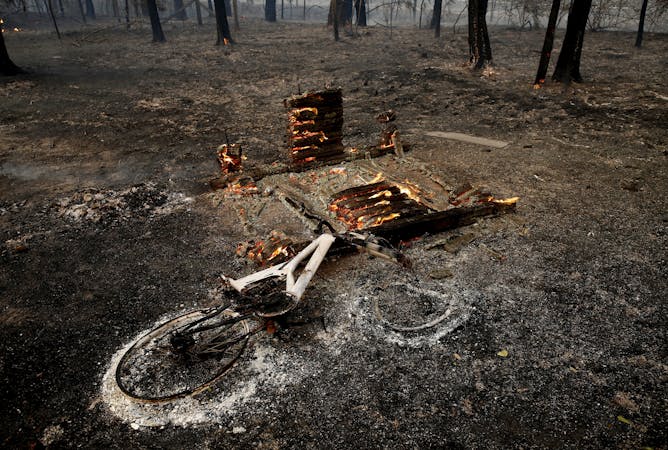|
|
|
Editor's note
|
|
If I park under that big spotted gum, I might lose the car and my escape from the flames. What if I can’t remember how to work the water pump? Should I stay? Or pack up the kids and go?
Living in a bushfire-prone area means every decision is shaped by fire risk. In this essay, Flinders University’s Dr Danielle Clode gives us a sense of how exhausting that must be. In an office in central Melbourne, it’s hard to get a sense of the dangers, but as Dr Clode explains, people live and die by the advice they are given, and the advice they ignore.
On top of this, Dr Clode approaches the issue from a unique perspective. Not only does she live in Adelaide Hills (currently on a catastrophic fire rating), she’s written numerous books about natural history and fire and has worked with the Country Fire Authority.
|
Lucy Beaumont
Deputy Section Editor: Arts + Culture
|

|
|
Top story
|

The smouldering ruins of a child’s bike lies amongst a property lost to bushfires in the Mid North Coast region of NSW last month.
Darren Pateman/AAP
Danielle Clode, Flinders University
Living in a bushfire-prone area means every decision - from plants to parking spots to holidays - is shaped by fire risk. We live and die by the advice we are given, and the advice we ignore.
|

The federal decision to eliminate a department of arts came as a surprise to public servants.
Jade Ferguson/Opera Queensland
Julian Meyrick, Flinders University
We care less about the arts when there is less to care about. The government of the day has backed Australian arts and culture into a corner and it must start telling its story better to survive.
|
Science + Technology
|
-
Szymek Drobniak, UNSW
Emerging evidence suggests that prolonged stress exposure can accelerate the ticking rate of an internal cellular clock. By doing so, stress can contribute to faster ageing and body deterioration.
-
Nalin Asanka Gamagedara Arachchilage, UNSW
While the data from a fingerprint is very hard to retrieve, cybercriminals can get around biometric technology in various ways. And having a weak passcode is like giving them a hall pass.
|
|
Health + Medicine
|
-
Vincent Ho, Western Sydney University
Poo can come in a range of colours, including green. Most of the time there's nothing to worry about, but there are a few signs it's time to see your GP.
-
Courtney Hempton, Deakin University
A marathon round of amendments and parliamentary debate will likely see voluntary assisted dying implemented in WA in around 18 months. It's time to start preparing.
|
|
Politics + Society
|
-
Michelle Grattan, University of Canberra
The situation with Naomi Wolf is another case of Angus Taylor being sloppy with facts and refusing to clean up his mess quickly.
-
Grant Duncan, Massey University
Yes, Jacinda Ardern is an intelligent, compassionate prime minister, but governing is difficult – and problems have inevitably arisen, or never gone away.
|
|
Business + Economy
|
-
Christopher Findlay, Australian National University
Introduced properly, 5G could have an enormous impact. We are placing it at risk.
-
Peter Martin, Crawford School of Public Policy, Australian National University
Spending growth has fallen to financial crisis lows. Per person, economic growth and spending has gone backwards. Josh Frydenberg isn't ruling out action in the pre-Christmas budget update.
|
|
Environment + Energy
|
-
Pep Canadell, CSIRO; Corinne Le Quéré, University of East Anglia; Glen Peters, Center for International Climate and Environment Research - Oslo; Pierre Friedlingstein, University of Exeter; Robbie Andrew, Center for International Climate and Environment Research - Oslo; Rob Jackson, Stanford University; Vanessa Haverd, CSIRO
Carbon emissions will hit a record high for the second year in a row, but there is a small silver lining: the rate of emissions growth has slowed dramatically.
-
David Yeates, CSIRO; Katja Hogendoorn, University of Adelaide; Manu Saunders, University of New England
Insects are vital to sustaining life on Earth – and their numbers are falling fast. So consider ditching the fly spray and see what you can do to help.
|
|
Cities
|
-
Peter Newman, Curtin University
Self-driving vehicles that constantly roam the streets looking for passengers could overwhelm cities. But, if kept in check, these vehicles could be useful for improving urban transport.
-
Geoff Hanmer, UNSW
Governments and regulators assume compliance with building regulations will restore public confidence. But complying with the National Construction Code won't fix many common defects.
|
|
Education
|
-
Sue Thomson, Australian Council for Educational Research
Australian education is still going backwards from where we started in 2000 – new PISA results show.
-
Julie Sonnemann, Grattan Institute
High performing systems focus on the same things Australian governments do, but they work much more intensively on making these things happen.
|
|
| |
Featured jobs
|

|
La Trobe University — Bundoora, Victoria
|

|
University of Melbourne — Parkville, Victoria
|

|
UNSW Sydney — Sydney, New South Wales
|

|
RMIT University — Melbourne, Victoria
|
|
|
|
| |
| |
| |

|
| |
| |
| |
Featured events
|

|
Roundhouse, UNSW, Sydney , New South Wales, 2052, Australia — UNSW
|

|
137 St Georges Terrace, Perth, Perth, Western Australia, 6000, Australia — Curtin University
|

|
Melbourne Burwood Campus, 221 Burwood Highway,, Burwood, Victoria, 3125, Australia — Deakin University
|

|
Kolling Institute of Medical Research, Kolling Auditorium, Level 5, Building 6, Royal North Shore Hospital, 10 Westbourne Street , St Leonards, New South Wales, 2064, Australia — University of Sydney
|
|
|
|
| |
| |
| |
| |
| |
|
|
|
|
|
|
|